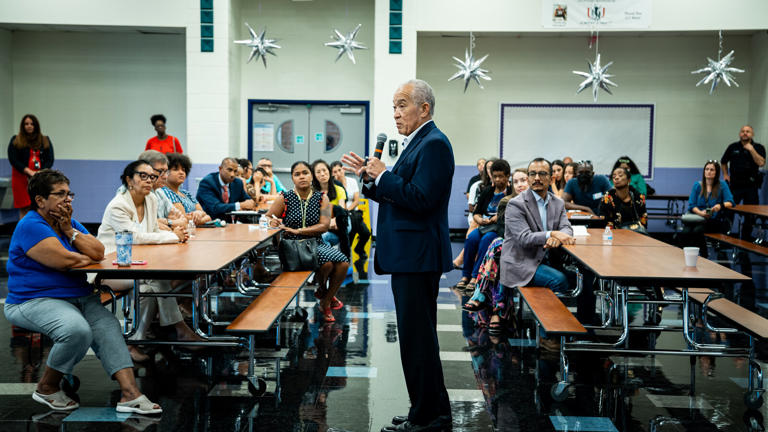
Houston, TX — Cheryl Hensley, a seasoned librarian in Houston, eagerly anticipated the start of the school year. Having devoted four decades to the city’s public school system, she had meticulously curated her collection at Lockhart Elementary, a predominantly Black school, with $40,000 worth of new books, earning her a prestigious statewide award.
However, the situation took a disappointing turn when Ms. Hensley, 62, received the news that her services were no longer required. Lockhart Elementary’s library was among several slated to be transformed into multipurpose computer spaces, partly designated for disciplinary purposes.
The decision to terminate librarians and essentially close down libraries in some of the city’s most economically challenged schools has ignited considerable controversy. This move was orchestrated by the recently appointed leadership of the Houston public school system, imposed by the administration of Governor Greg Abbott, affecting its 187,000 predominantly Black and Hispanic student population.
Earlier this year, the state of Texas assumed control over the Houston Independent School District, one of the nation’s largest, replacing the elected school board and the superintendent. This decision, long in the making, followed persistent academic struggles, previous allegations of misconduct among school trustees, and legislative changes enabling the state to take over school districts, supported by a moderate Black Democrat from Houston.
Since then, the newly appointed superintendent, Mike Miles, a former Army Ranger, State Department diplomat, and founder of a charter school network, albeit without official certification for the Houston role, has rapidly enacted a novel education strategy for the district. This approach centers on enhancing reading and math performance in numerous elementary and middle schools, aiming to bridge achievement gaps that persist among Houston students and between racial groups.
Acknowledging these disparities, Superintendent Miles stated during a community meeting, “The future is here, and we’re behind. It means we have to do bold things now.”
Takeovers of underperforming school systems by state authorities, though widespread, have shown mixed outcomes, as noted by Beth Schueler, a University of Virginia School of Education professor who has extensively researched the matter. She explained that successful interventions often occurred in districts that were already among the nation’s lowest-performing, and on average, these interventions yielded neutral to negative results.
Given the scope of the takeover in Houston, Schueler believes it could serve as a model or a warning for similar future actions.
As the takeover unfolded, numerous Houston parents and educators, residing in a heavily Democratic city, voiced concerns about their diminished influence over local schools. Some speculated that state Republican leaders aimed to erode support for public education, potentially steering parents towards charter or private schools.
Conversely, other individuals, including parents and ousted board members, contended that the district had not adequately addressed the needs of students in struggling schools. They urged patience with the new leadership.
The state’s intervention commenced in spring, coinciding with Governor Abbott’s advocacy for using state funds to support private school vouchers. Despite this, the governor maintained that his campaign for “parental empowerment” remained separate from the Houston takeover, which he had advocated for since at least 2019. Texas Education Commissioner Mike Morath justified the takeover as essential to prompt swift changes in the most underperforming schools, despite progress made prior to the intervention. The district had earned a “B” grade from the state the previous year.
With the first day of school looming on August 28, opposition to the takeover has grown increasingly vocal. In recent weeks, more than 200 protesters gathered outside the district headquarters. One sign read, “Houston Occupied School District,” while another proclaimed, “Even prisons have libraries.”
Jessica Campos, a concerned parent from Pugh Elementary, a dual-language Spanish school slated for immediate transformation, expressed her apprehensions: “It doesn’t feel right. I lose sleep over this. It’s a serious thing. These are our children, and we’re not having a say in our children’s education, and that is not OK.”
The newly established state administration aims to establish a fresh educational framework in elementary and middle schools that funnel into underperforming high schools. This approach focuses on strengthening reading and math skills, incentivizing teachers with improved student scores on standardized tests, and delegating time-consuming tasks, such as grading and lesson planning, to support staff. Additionally, community members will be recruited to teach elective courses, including photography and spin classes.
Under this plan, certain school libraries will be repurposed as “team rooms,” a term that a department spokesperson acknowledged could be misleading. While some students may collaborate in teams, those assigned due to disciplinary issues will be expected to work individually at desks, utilizing laptops to follow their classes remotely.
Superintendent Miles defended this decision as a necessary trade-off given limited space and resources. He assured that students in schools where libraries have been converted would still have access to borrow books before or after school.
However, Sylvester Turner, the mayor of Houston, criticized the plan for potentially creating a dual-tiered system. He voiced his concern during a City Council hearing, saying, “He’s gone too far, and he’s dismantling the largest educational district in the state of Texas. What the hell are you doing?”
These political tensions unfold against the backdrop of broader conservative movements across the nation, advocating for changes in public education. This includes promoting candidates for local school boards who align with conservative viewpoints and pushing for restrictions on discussions about race, gender, and the content of school library materials.
Given this context, some Houston parents and educators view the state’s intervention as politically motivated.
Previously under Democratic control, the local school board’s authority has been entirely superseded by the newly appointed board of managers designated by the Texas Education Agency. Notably, in one instance, a school board member was replaced by the candidate who had lost in the previous election.
Amid these changes, the American Civil Liberties Union of Texas raised concerns about the disenfranchisement of voters of color who elected the previous school board. The organization called for a Justice Department investigation into the matter.
Yet, some of the replaced board members expressed support for Superintendent Miles and advocated giving him an opportunity to succeed. In a joint statement published in The Houston Chronicle, they affirmed, “We believe that no one chooses to sit at that dais who doesn’t have the best intentions for students in their heart.”
Tish Ochoa, a parent representative on a district advisory committee, appreciated certain elements of the new strategy, such as reallocating funds from the district’s central office to underperforming schools. However, she emphasized the need for improved communication and engagement with the community. Regarding the library transformation, she remarked, “I am not in favor of turning libraries into discipline centers. I am in favor of a superintendent who is honest about our problems. The bottom line is that in some of these schools, kids can’t read.”
The initial implementation of the plan targets 28 elementary and middle schools that funnel into struggling high schools, including Wheatley High School, which triggered state intervention due to its low performance. Over 50 additional schools have also chosen to adopt aspects of Superintendent Miles’s strategy.
Superintendent Miles, who established and led the Third Future Schools charter network, previously held the position of superintendent of schools in Dallas, where he experimented with similar approaches. However, as noted by David DeMatthews, a professor at the University of Texas at Austin, the schools in Dallas did not exhibit improvement by national standards, and teacher turnover escalated notably. Recent data from Mr. Miles’s company highlights higher scores in smaller Texas school districts that partnered with Third Future Schools.
During presentations to sometimes skeptical parents over the summer, Superintendent Miles frequently emphasized preparing students for a swiftly evolving job landscape dominated by technology and artificial intelligence.
At a predominantly Black middle school in South Houston, Superintendent Miles engaged with Cheryl Hensley, the librarian who had recently been informed of her dismissal. Ms. Hensley pointed out that her role encompassed computer literacy, community-building, and lending books, prompting applause from many attendees.
In response, Mr. Miles acknowledged, “Everything is important. It’s not that I don’t like libraries. We’re not trying to get rid of all the libraries. We have to prioritize resources.” Despite concerns and criticism, the Houston school district’s transformation under state leadership continues to unfold.



